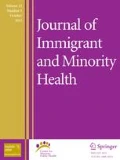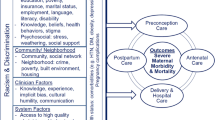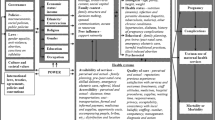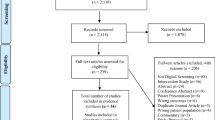Abstract
To assess whether there are differences in the timing of first antenatal care visit between 1st and 2nd-generation migrants, and if so, how such differences could be explained. The study has been conducted in the framework of Generation R Study, a multi-ethnic population-based study conducted in Rotterdam, the Netherlands. The study population consists of 845 women of the six largest ethnic groups. Data were derived from the electronic antenatal charts of the participating midwives and from written questionnaires. Logistic regression analyses have been carried out to investigate whether difference could be explained by need, predisposing and enabling factors. More first than second generation women enter antenatal care after 14 weeks of pregnancy (28.1 vs. 18.7 %). Women who were not likely to adopt healthy behaviour regarding pregnancy—such as timely taking folic acid—equally were not inclined to enter antenatal care early in pregnancy. The role of Dutch language mastery was limited. Given our results, first generation women are less likely to receive timely health educational advice or to benefit from screening opportunities than second generation women. Future studies should pay more attention to adequate assessment of proficiency of the host language.

Similar content being viewed by others
References
Kupek E, Petrou S, Vause S, Maresh M. Clinical, provider and sociodemographic predictors of late initiation of antenatal care in England and Wales. BJOG. 2002;109(3):265–73.
Alderliesten ME, Vrijkotte TG, van der Wal MF, Bonsel GJ. Late start of antenatal care among ethnic minorities in a large cohort of pregnant women. BJOG. 2007;114(10):1232–9.
Park JH, Vincent D, Hastings-Tolsma M. Disparity in prenatal care among women of colour in the USA. Midwifery. 2007;23(1):28–37.
Ny P, Dykes AK, Molin J, Dejin-Karlsson E. Utilisation of antenatal care by country of birth in a multi-ethnic population: a four-year community-based study in Malmö, Sweden. Acta Obstet Gynecol Scand. 2007;86(7):805–13.
Rowe RE, Magee H, Quigley MA, Heron P, Askham J, Brocklehurst P. Social and ethnic differences in attendance for antenatal care in England. Public Health. 2008;122(12):1363–72.
Choté AA, de Groot CJ, Bruijnzeels MA, Redekop K, Jaddoe VW, Hofman A, et al. Ethnic differences in antenatal care use in a large multi-ethnic urban population in the Netherlands. Midwifery. 2011;27(1):36–41.
Foets M, Schuster J, Stronks K. Gezondheids(zorg)onderzoek onder allochtone bevolkingsgroepen. Een praktische introductie. 2007.
Bais JMJ, Pel M. The basis of the Dutch obstetric system: risk selection. Eur Clin Obstet Gynecol. 2006;2(4):209–12.
AbouZahr C, Wardlaw T. Antenatal care in developing countries: promises, achievements and missed opportunities-an analysis of trends, levels and differentials, 1990–2001.: World Health Organization; 2003.
Villar J, Bergsjo P. Scientific basis for the content of routine antenatal care. I. Philosophy, recent studies, and power to eliminate or alleviate adverse maternal outcomes. Acta Obstet Gynecol Scand. 1997;76(1):1–14.
Choté AA, Koopmans GT, Redekop WK, de Groot CJ, Hoefman RJ, Jaddoe VW, et al. Explaining ethnic differences in late antenatal care entry by predisposing, enabling and need factors in the Netherlands. The Generation R Study. Matern Child Health J. 2011;15(6):689–99.
Timmins CL. The impact of language barriers on the health care of Latinos in the United States: a review of the literature and guidelines for practice. J Midwifery Women’s Health. 2002;47(2):80–96.
Jacobs E, Chen AH, Karliner LS, Agger-Gupta N, Mutha S. The need for more research on language barriers in health care: a proposed research agenda. Milbank Q. 2006;84(1):111–33.
Gijsberts MDJ. Jaarrapport integratie 2009. The Hague: The Netherlands Institute for Social Research/SCP; 2009.
Andersen RM. National health surveys and the behavioral model of health services use. Med Care. 2008;46(7):647–53.
Wiegers TA, van der Velden LFJ, Hingstman L. Behoefteraming verloskundigen 2004–2015. Utrecht: NIVEL; 2005.
Nutbeam D. The evolving concept of health literacy. Soc Sci Med. 2008;67(12):2072–8.
Pagnini DL, Reichman NE. Psychosocial factors and the timing of prenatal care among women in New Jersey’s HealthStart program. Fam Plann Perspect. 2000;32(2):56–64.
Trinh LT, Rubin G. Late entry to antenatal care in New South Wales, Australia. Reprod Health. 2006;3:8.
Nothnagle M, Marchi K, Egerter S, Braveman P. Risk factors for late or no prenatal care following Medicaid expansions in California. Matern Child Health J. 2000;4(4):251–9.
Jaddoe VWV, Mackenbach JP, Moll HA, Steegers EAP, Tiemeier H, Verhulst FC, et al. The Generation R Study: design and cohort profile. Eur J Epidemiol. 2006;21(6):475–84.
Jaddoe VW, van Duijn CM, van der Heijden AJ, Mackenbach JP, Moll HA, Steegers EA, et al. The Generation R Study: design and cohort update until the age of 4 years. Eur J Epidemiol. 2008;23(12):801–11.
Stronks K, Kulu-Glasgow I, Agyemang C. The utility of ‘country of birth’ for the classification of ethnic groups in health research: the Dutch experience. Ethn Health. 2009;14(3):255–69.
Timmermans S, Jaddoe VW, Mackenbach JP, Hofman A, Steegers-Theunissen RP, Steegers EA. Determinants of folic acid use in early pregnancy in a multi-ethnic urban population in the Netherlands: The Generation R Study. Prev Med. 2008;47(4):427–32.
van Eijsden M, van der Wal MF, Bonsel GJ. Folic acid knowledge and use in a multi-ethnic pregnancy cohort: the role of language proficiency. BJOG. 2006;113(12):1446–51.
Phillippi JC. Women’s perceptions of access to prenatal care in the United States: a literature review. J Midwifery Womens Health. 2009;54(3):219–25.
Smith GD, Chaturvedi N, Harding S, Nazroo J, Williams R. Ethnic inequalities in health: a review of UK epidemiological evidence. Crit Public Health. 2000;10(4):375–408.
Scheppers E, van Dongen E, Dekker J, Geertzen J, Dekker J. Potential barriers to the use of health services among ethnic minorities: a review. Fam Pract. 2006;23(3):325–48.
Berghella V, Buchanan E, Pereira L, Baxter JK. Preconception care. Obstet Gynecol Surv. 2010;65(2):119.
Acknowledgments
We gratefully acknowledge the contribution of all women participating in the Generation R study and the midwives in Rotterdam, who provided data for this study. The first phase of the Generation R Study was made possible by financial support from the Erasmus Medical Centre, Rotterdam, the Erasmus University Rotterdam and the Netherlands Organization for Health Research and Development (ZonMw). The department of Health Policy and Management received an additional grant, specifically for the study presented in this article, from the Netherlands Organization for Scientific Research (NWO), in collaboration with the Netherlands Organization for Health Research and Development (ZonMw) (Grant No. 261-98-911). Supplementary financing was received from the Department of Health Policy and Management to accomplish this study.
Conflict of interest
No conflict of interests.
Author information
Authors and Affiliations
Corresponding author
Rights and permissions
About this article
Cite this article
Choté, A.A., Koopmans, G.T., de Groot, C.J.M. et al. Differences in Timely Antenatal Care Between First and Second-Generation Migrants in the Netherlands. J Immigrant Minority Health 16, 631–637 (2014). https://doi.org/10.1007/s10903-013-9841-5
Published:
Issue Date:
DOI: https://doi.org/10.1007/s10903-013-9841-5




